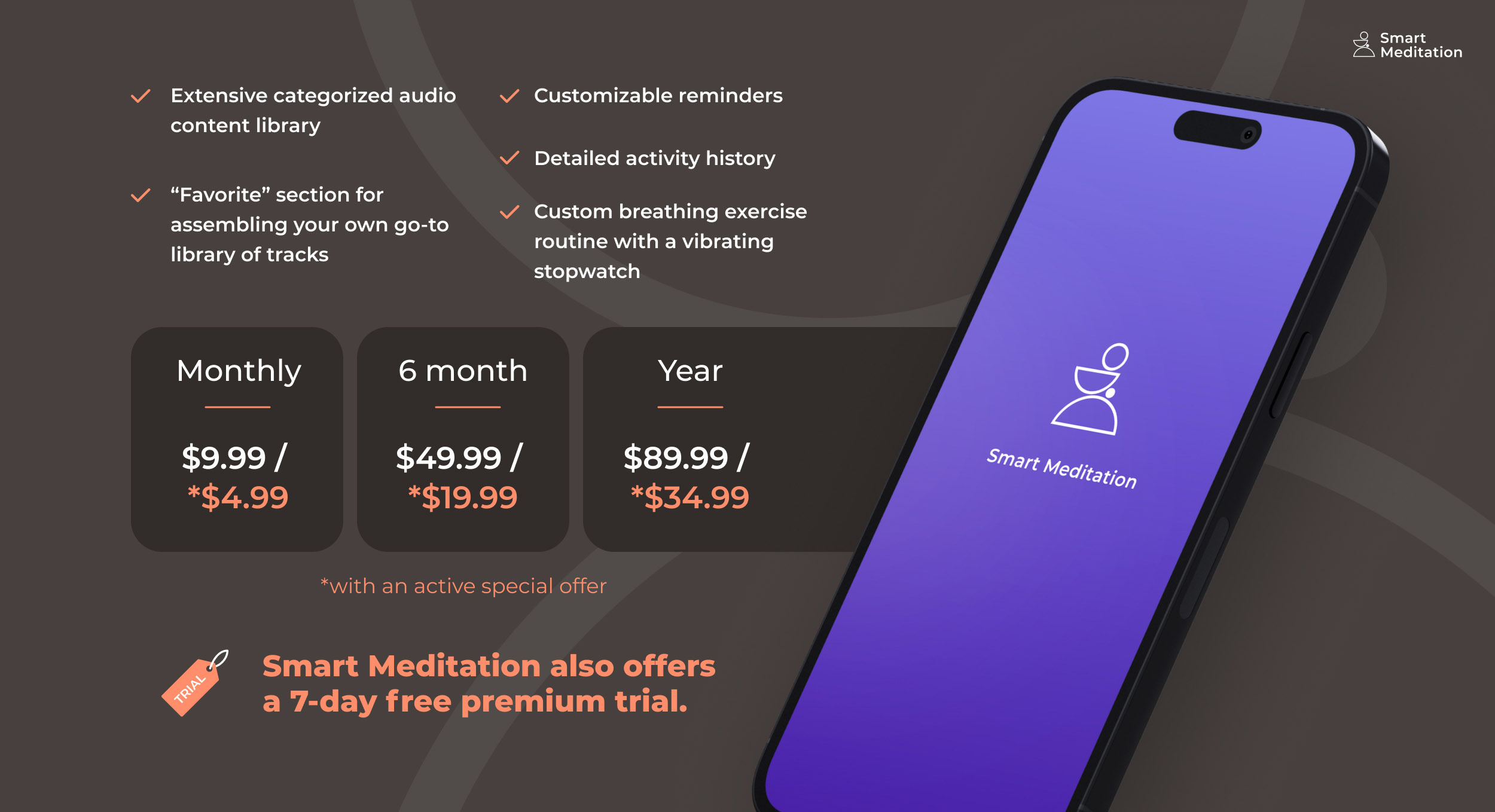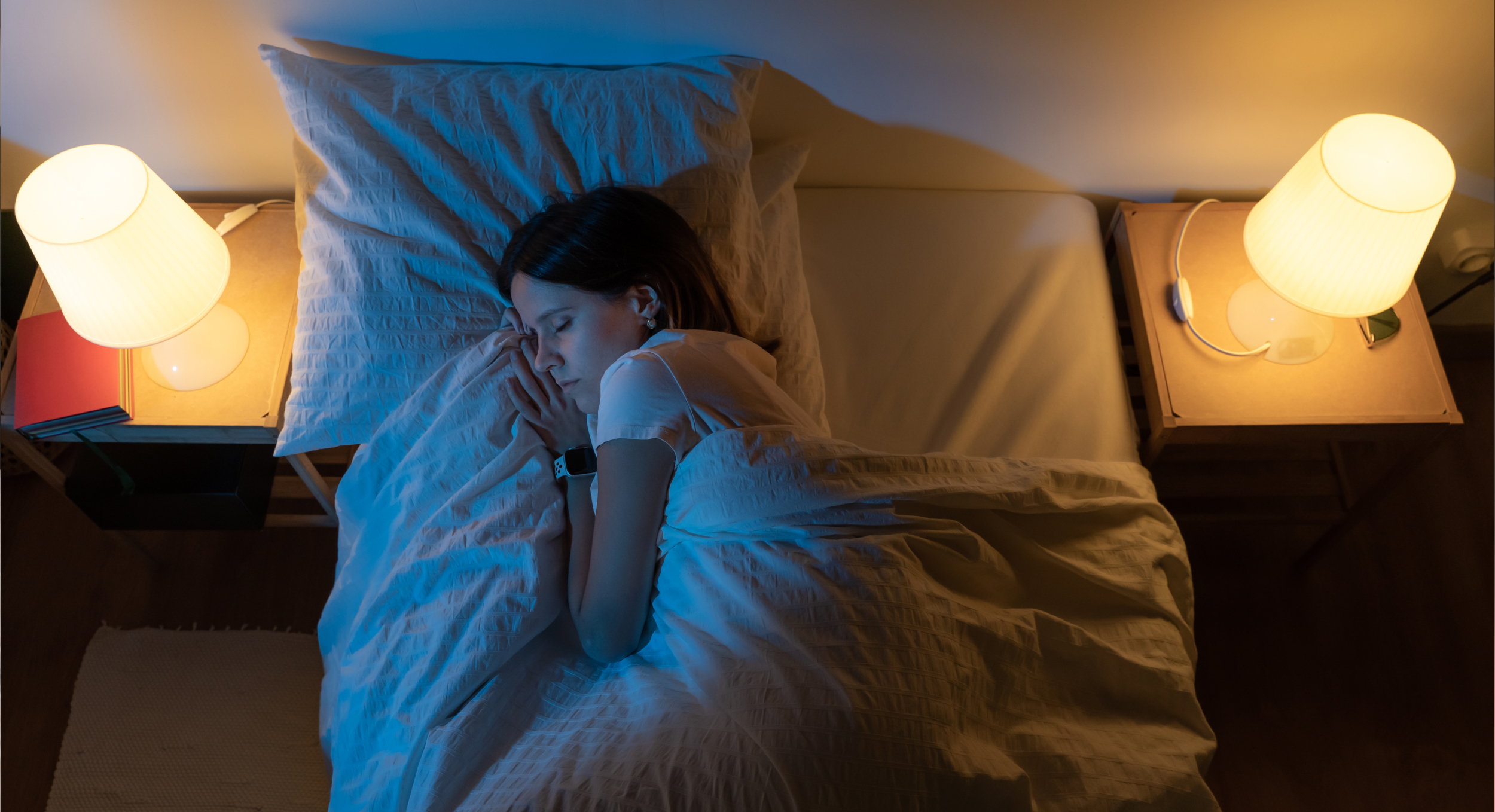
Transform Your Sleep: Meditation Apps for a Restful Night
In one of our previous articles, we’ve talked about how great meditation is for your sleep. It helps you fall asleep faster, makes your sleep more restorative and improves your general wellbeing.
In this one, we’re taking it a step further – we’re going to take a look at how your bedtime meditation can be complemented by mobile sleep meditation apps. We’ll dive deep into what these apps do, what features you should look out for, how to integrate them into your routine, and, most importantly, will provide you with three great products for your consideration.
Understanding Meditation Apps
Over the past decade, it’s been fascinating to watch how modern technology and traditional mindfulness techniques can coexist in the form of apps for sleep meditation, providing accessible means of achieving mental clarity and emotional balance. How do they do that? We’ve answered this question before, but, in a nutshell, they act as virtual assistants and present their users a range of meditation practices through guided sessions with audio and visual cues. Guided exercises like deep breathing, mindfulness, body scanning, and guided imagery all add to the practice, making it more engaging and fulfilling.
It’s also interesting to note that the rise in popularity of meditation apps corresponds to a general trend towards holistic self-care and wellbeing. The use of AI-powered algorithms has enabled certain applications to provide tailored content recommendations, fine-tuning meditation sessions in accordance with individual preferences and progress.
For a more scientific approach to understanding meditation apps, we can turn to a great amount of research done by scholars from all over the world. For instance, in one 2019 study, 88 participants used a well-known sleep meditation app for eight weeks. Once the experiment was over, participants reported significantly lower levels of felt anxiety when compared to the control group which was not using the app
Features to Look for in a Meditation App for Sleep
High-quality sleep meditation apps should still have all the good features of a basic app such as a user-friendly interface and rich functionality. And on top of that, there is a range of meditation-specific features that you many want to see in your app:

- Special attention to sleep inducing activities: The app should contain guided meditation sessions that specifically address sleep difficulties – racing thoughts, anxiety, and restlessness. Look for ones with a separate “Sleep” category or playlists, as those usually include great mindfulness and body scan exercises for gradually falling asleep.
- Library of bedtime stories: Find applications that provide bedtime tales for grownups (yes, they are not only for children). These tales are expertly written, with peaceful storylines, calming voices, and a leisurely tempo, providing a mental vacation from the day’s pressures, promoting relaxation and lulling you to sleep.
- Presence of breathing techniques: A good meditation app for sleep will also enable you to perform greatly beneficial breathing exercises such as the 4-7-8 method, for instance. Diaphragmatic breathing triggers our parasympathetic nervous system, which induces relaxation and combats the sleep-disturbing stress reactions of our bodies.
- Enabled Customization: Look for apps that let you control the length and depth of your meditation sessions. Good products will often include many customizable meditation courses intended to strike the perfect balance of relaxation and stimulation as well as leaving the options open enough for you to experiment.
- Sleep-Inducing Design: It’s always a nice bonus when an app has a dark mode and blue light filters, as they are essential for reducing sleep interruptions brought on by screens. With less exposure to blue light and its ability to interfere with your sleep-wake cycle, your body can more easily retain its normal sleep patterns with the help of meditation.
Top Meditation Apps for Sleep
Now let’s briefly take a look at some of the best meditation apps for sleep on the market – without necessarily comparing them, but just showing you what they’re capable of. Rest assured, all three are very good choices.
Smart Meditation

Smart Meditation has all of its basic features available in the version. They include, but not limited to:
- Extensive categorized audio content library
- Customizable reminders
- Detailed activity history
- “Favorite” section for assembling your own go-to library of tracks
- Custom breathing exercise routine with a vibrating stopwatch
The selling point of the app is its integration with a Smart Meditation EEG headband. It enables you to monitor your brain activity while meditating and track your “fatigue” parameter, which notifies you when it’s best to meditate or not to do that.
You can also purchase the premium version of the app, which unlocks the entire content library for the user – the premium pricing looks like this:
- Monthly – $9,99 (with a discount – $4,99);
- Biannually – $49,99 (with a discount – $19,99);
- Annually – $89,99 (with a discount – $34,99);
Smart Meditation also offers a 7-day free premium trial.
Calm
Most of Calm’s strongest features are also available in the free version, but, unfortunately, the course selection is limited to only a couple of trial sessions. Its features are as follows:
- Extensive categorized audio content library
- Detailed activity history
- “Favorite” section for assembling your own go-to library of tracks
- Search bar and filters for easier content selection
- Customizable background and color scheme
- Customizable reminders
- Daily mood check-ins for mindset monitoring
Similar to Smart Meditation, Calm offers a premium only for opening access to their library of tracks. Another similarity is that they also offer a 7-day free premium trial to study the library without any commitment.
The premium pricing model for Calm is very simple – $47,99/year ($3,99/month, varies across the world), billed annually. There’s also a lifetime license alternative for a price of $399,99.
Breethe
Breethe is also a freemium app; all the functionality is available for free, with the only limitation being the course library. However, with at least 90 tracks unlocked even for the free version, you may not have to pay for Breethe at all. Its features include:
- Extensive categorized audio content library
- Detailed activity history
- Journaling system
- Filters for easier content selection
- Customizable reminders
- “Favorite” section for assembling your own go-to library of tracks
- Community interaction capabilities
If you do decide to purchase the premium Breethe, it will cost you:
- Monthly – $12.99
- Yearly – $89.99
- 2 Year + Free Lifetime Upgrade – $149.99
- Lifetime – $399.99
Breethe also offers a 14-day free premium trial.
How to Incorporate Meditation Apps into Your Sleep Routine
In our meditation spot setup guide, we’ve talked about how a well crafted space benefits consistency. Now let’s talk about how you can make sleep meditation apps a consistent part of your life as well so that your practice is at its most effective. Start by choosing an app for meditation and sleep (feel free to refer to one of the above) that provides guided sessions created specifically for sleep. Once you’ve made your choice, set aside a specified period of time for meditation as part of your evening practice – this should ideally happen between 30 and 60 minutes before going to bed.
With the help of an app you can now start setting simple reminders to indicate the beginning of your session and, ultimately, help you in creating a new habit. To create a tranquil atmosphere, explore app features like nature sounds or calming music that accompany the guided meditation. Engage in mindfulness by focusing on your breath and the instructor’s guidance, gently redirecting your attention if distractions arise. At the same time, the app shouldn’t be used (or should see very limited use) too close to bedtime since screen time might disrupt the creation of melatonin.
Finally, do try out the journaling features or features with similar functionality. It’s way easier to get used to the app and integrate it into your routine when you make notes in it every day, tracking your progress and putting down some thoughts.
Conclusion
Best apps for sleep meditation provide guidance, assistance as well insights and recommendations on how you can improve your bedtime meditation practice. A good app for sleep meditation will have a rich library of soothing tracks and bedtime stories, a host of breathing exercises as well as customization capabilities and a sleep-inducing design. When choosing the best guided sleep meditation app, you’ll be safe picking any from the trio of Smart Meditation, Calm, Breathe – all very similar, very powerful products. And once you choose which one to use, make sure you’re taking steps in the direction of integrating the app into your sleep meditation routine.





